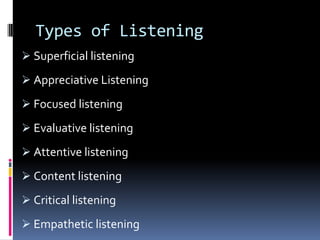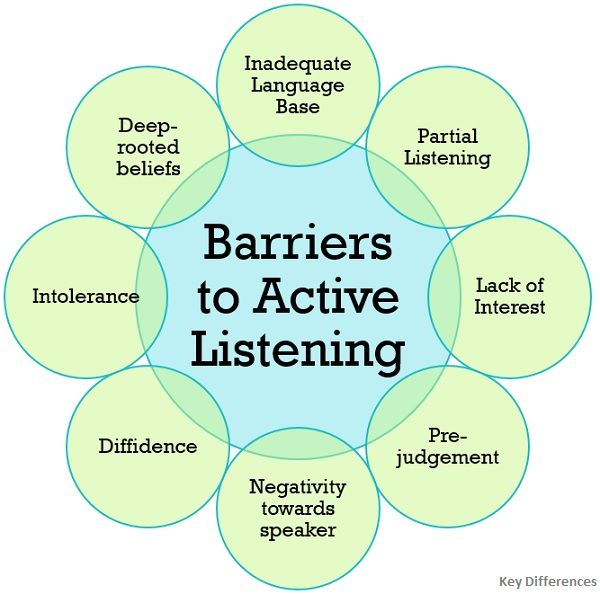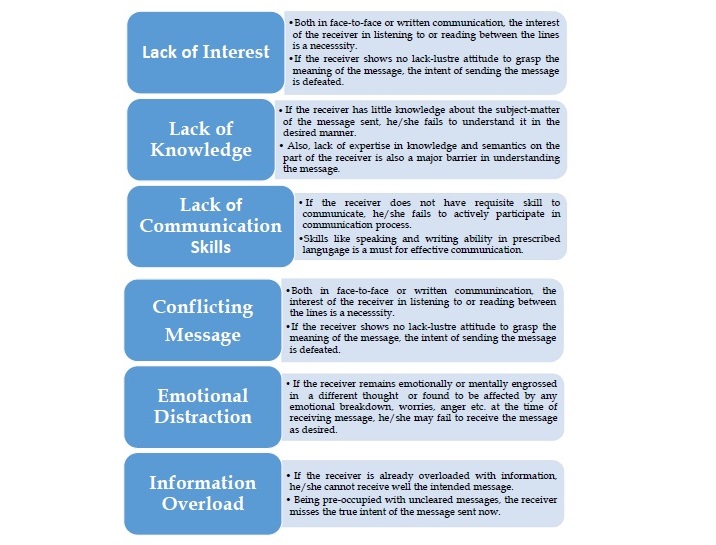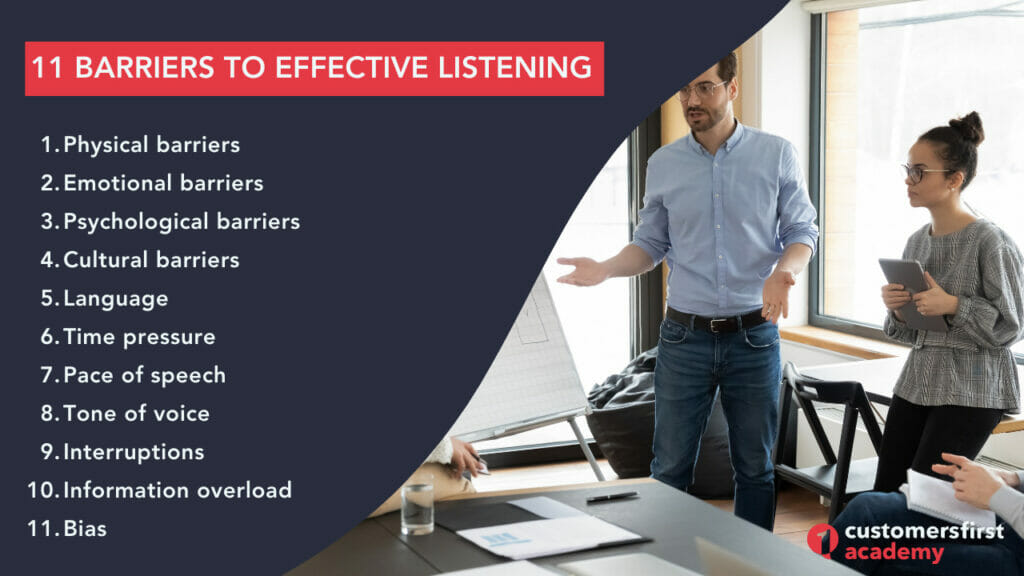Explain the Different Barriers to Listening
This handout talks through a number of different barriers to listening. New questions in Sociology.

Types And Barriers To Listening
Listening barriers may be psychological eg the listeners emotions or physical eg noise and visual distraction.

. 13 SET -2 07 List the differences between extensive reading and intensive reading 14 08 Explain the different. How to build your body. As youre reading through them identify if any of the barriers apply to you.
Prejudice is a preconceived opinion of feeling which is usually irrational. Do you find yourself pulled away from the conversation. Different cultures have different modes and patterns of communication that can hinder effective listening if the listener is either unfamiliar with the speakers patterns or holds a mistaken view about them.
Paying attention becomes particularly difficult if you are a daydreamer. Seventy percent of our waking time is spent in some sort of communication situation. These kinds of cultural differences include speakers accents and vocabulary as well as assumptions about.
What are the different barriers to listening. Wrong assumptions on the part of sender or receiver may hinder effective listening. 11 06 Explain the advantages of oral communication with the help of suitable example.
Moreover multitasking is often one of the biggest barriers to active listening. Some specific examples of noise in the office are. Explain the different barriers to listening.
If the receiver has hearing problems or the speaker has speech disabilities then communication will not be effective. Barriers to Listening Information Overload. There is some overlap here with.
Judgment of the speaker or the topic. Listening is a critical leadership skill. No manager rated herself or himself as poor or very poor.
There are five main types of noise that can easily prevent active listening. Physical barriers are the oftentimes tangible obstacles or boundaries that keep team members apart. Environmental and physical barriers to effective listening include furniture placement environmental noise such as sounds of traffic or people talking physiological noise such as a sinus headache or hunger and psychological noise such as stress or anger.
Information overload personal concerns or issues outside distractions prejudice and rate of speech and thought. While it seems easy to listen there are many things that pull our attention away from the conversation in front of us. Do some apply when you are listening to certain people.
Environmental factors such as lighting temperature and furniture affect our ability to listen. List the differences between discriminative listening and comprehension listening. Negative perceptions due to cultural or background differences between the speaker and the listener may lead to selective listening.
Prejudice is very dangerous. It is a necessary skill in order to survive in often very noisy environments however our. They include but are not limited to.
Without listening we cannot be an effective leader. What are the 7 barriers to communication. You attend school you probably work you.
Which do you fall prey to. Any external noise can be a barrier like the sound of equipment running phones ringing or other people having conversations. However some of the most common barriers to effective listening include low concentration lack of prioritization poor judgement and focusing on style rather than substance.
Difficult customers or co-workers. Table of Contents. Over 90 percent placed themselves in the good or very good category.
Here are seven different types of listening that can negatively impact our ability to effectively connect with and truly hear what others have to say. It will distort the message. 11 Mobile phones and other smart devices.
10 Barriers to Effective Listening with Tips to Overcome Them Excessive Talking. A person lacking listening skills does not listen in an effective manner and tends to spoil the very intention of oral communication. Early morning exercise is one of the.
And what is his age. Good conversational skills are an asset and a person with these skills are more likely to achieve. Top 5 Barriers to Effective Listening at a workplace.
It can be hard to listen effectively if there is too much background noise. 1 Distraction and being preoccupied. If youre picturing closed doors high cubicle walls and blocked off areas then youre on the right track.
Top 3 Obstacles to Listening. Barriers to active listening are generally different kinds of noise. Too much noise around you.
A room that is too dark can make us sleepy just as a room that is too warm or cool can raise awareness of our physical discomfort to a point that it is distracting. We all listen selectively at some time or other. So we Skald forom good habits to keep up our good healthier.
In one study a group of managers were asked to rate their listening skills. Visual distractions can be as simple as the scene outside a window or the goings-on just beyond the glass walls of a nearby office. Here are ten common barriers to listening.
The more you know about noise the more you can learn about how to eliminate it. Trying to listen to more than one conversation at a time. 08 05 Discuss the principles of business writing.
Well discuss five different barriers to effective listening. Who is bene schulz. Environmental and Physical Barriers to Listening.
Lets face it you have a lot going on in your life. What are the barriers of effective listening explain. From a person walking by to email popping up on your computer screen anything can be a listening barrier that distracts you.
Distraction or daydreaming. Sensitive topics make it difficult for the speaker or the receiver. Exereise We all know that health is wealth and good health is the source of happiness.

Difference Between Active Listening And Passive Listening With Barriers To Active Listening Examples And Comparison Chart Key Differences

Effective Communication Barriers

11 Barriers To Effective Listening And Tips To Overcome Them Customersfirst Academy
No comments for "Explain the Different Barriers to Listening"
Post a Comment